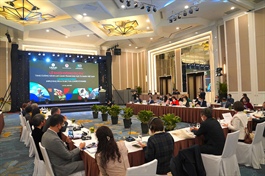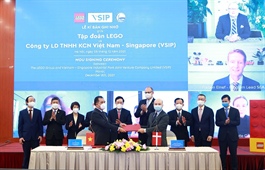US groups seeking practical and stable environment
US groups seeking practical and stable environment
Vietnam’s economy has weathered difficulties to gradually recover, with the major contributions from the foreign business community. Adam Sitkoff, executive director from the American Chamber of Commerce (AmCham) Hanoi, talked with VIR’s Thanh Tung about how US businesses are operating in Vietnam and what they are expecting for the new year.
How did US companies perform in Vietnam in 2021?
Last year was challenging for everybody, regardless of business sector. Companies had operational challenges, supply chain challenges, mobility challenges, and more. The biggest challenge for US companies in Vietnam was the frequent changes in regulations that were announced and implemented on short notice.
That is why AmCham urged our partners in the government to ensure that policies are practical, effective, and sustainable. We believe that new rules and regulations should be clear and not rely on undefined concepts such as being “essential”. The government should consult industry representatives before new policies are announced. Most importantly, we need to see better coordination at all levels of government on implementing pandemic-related policies.
Even in this challenging time of uncertainty and anxiety, US companies in Vietnam stepped up to help address society’s needs and I am very proud of the good work many AmCham members do here to support their team members, community, and Vietnam’s COVID-19 response and recovery.
What did US companies contribute to the country’s economic growth?
US companies and investors have contributed significantly to the transformation and growth of Vietnam’s economy. This continues today as AmCham members represent billions of US dollars in foreign investment, tens of thousands of direct employees, hundreds of thousands of indirect employees, and a significant share of Vietnam’s exports and tax revenues.
Our two countries had around $100 billion in trade last year and the United States remains the largest export market for Vietnam, even during these tough times.
What are such groups expecting in the Vietnam in 2022, both in policy reforms and market opportunities?
As major investors here, American companies are invested in Vietnam’s continued success and we are looking towards a bright future here. For Vietnam to be successful, non-productive red tape must be controlled and the country’s regulatory framework must be both stable and predictable.
Many business people remain concerned about changes in policy and regulations which are not consistent with international best practices. We encourage continuous improvements in infrastructure development, protection of intellectual property, education reform, legal and tax policy certainty, and enhanced transparency in Vietnam.
We commend recent decisions to facilitate cross-border travel and we encourage additional actions to reduce the burdens on both inbound and outbound international travel by both foreigners and Vietnamese citizens. Safety is the top priority, but our hope is to see more predictable, streamlined procedures for our executives, incoming investors, and technical support teams to maintain operations and facilitate expansion and new investment.
Permission to enter Vietnam remains challenging due to complicated and burdensome paperwork procedures and difficulties getting work permits because of requirements established last year regarding foreign employees working in Vietnam.
Maybe the most important is to enact smooth, fair, and consistent tax and audit procedures that avoid retroactive rulings that vary from province to province, and conflict with global supply chain tax procedures. Progress in these areas will not only help attract more foreign investment but will also support Vietnam’s aspirations to propel itself to the next sphere of economic competitiveness.
With a growing trade imbalance, it is critical that US companies and investors encounter a fair, transparent, predictable, and streamlined regulatory environment that values innovation. This will not only attract new investment, but will also maintain and grow the investment that is already here.
In addition, we recommend that foreign investment limitations, an overly restrictive legal framework of laws, and burdensome administrative procedures should be carefully reviewed and selectively relaxed to encourage increased US investment.
We know the economic implications of the pandemic for Vietnam are severe and will impact us for quite some time. Even as the economy begins to recover, the financial pressure for many companies will remain significant. However, I remain optimistic and see great opportunities and a bright future for US companies here.
Do you think in order for enterprises from both sides to further tap into the respective markets, the US should rejoin the Comprehensive and Progressive Agreement for Trans-Pacific Partnership (CPTPP)?
I have seen how US companies, farmers, workers, and investors have been disadvantaged since the United States pulled out five years ago and I believe that the CPTPP remains the highest-standard multilateral agreement in existence. Although the politics of trade is complicated in the US, AmCham will continue to advocate for strengthening the bilateral trade and investment relationship, ideally through US entry to the CPTPP.
I also hope that the US and Vietnamese governments can begin efforts towards a bilateral free trade agreement. This will not happen soon, but it would improve investment and trade flows, would assist sustainable supply chains, and would improve business conditions that strengthen the private sector, ensure sustainable economic and social development, and promote prosperity here.
























